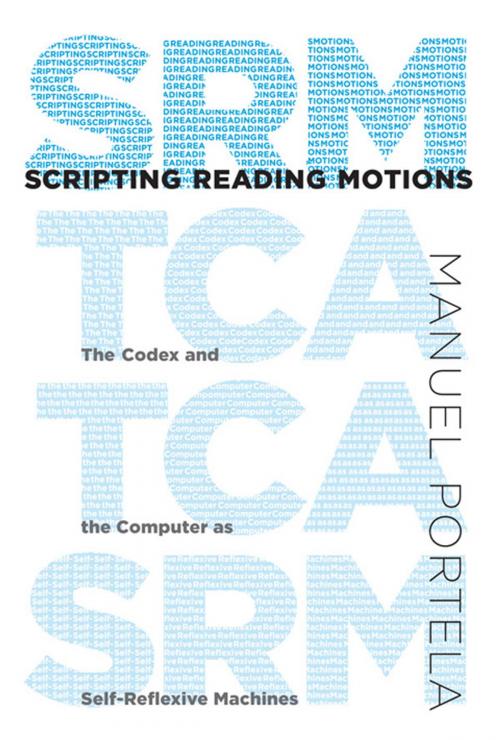Scripting Reading Motions
The Codex and the Computer as Self-Reflexive Machines
Nonfiction, Computers, General Computing, Social & Cultural Studies, Social Science| Author: | Manuel Portela | ISBN: | 9780262317368 |
| Publisher: | The MIT Press | Publication: | September 13, 2013 |
| Imprint: | The MIT Press | Language: | English |
| Author: | Manuel Portela |
| ISBN: | 9780262317368 |
| Publisher: | The MIT Press |
| Publication: | September 13, 2013 |
| Imprint: | The MIT Press |
| Language: | English |
An exploration of what experimental literature in both print and programmable media tells us about the act of reading.
In Scripting Reading Motions, Manuel Portela explores the expressive use of book forms and programmable media in experimental works of both print and electronic literature and finds a self-conscious play with the dynamics of reading and writing. Portela examines a series of print and digital works by Johanna Drucker, Mark Z. Danielewski, Rui Torres, Jim Andrews, and others, for the insights they yield about the semiotic and interpretive actions through which readers produce meaning when interacting with codes. Analyzing these works as embodiments and simulations of the motions of reading, Portela pays particular attention to the ways in which awareness of eye movements and haptic interactions in both print and electronic media feeds back onto the material and semantic layers of the works. These feedbacks, he argues, sustain self-reflexive loops that link the body of the reader to the embodied work. Readers' haptic actions and eye movements coinstantiate the object that they are reading.
Portela discusses typographic and graphic marks as choreographic notations for reading movements; examines digital recreations of experimental print literary artifacts; considers reading motions in kinetic and generated texts; analyzes the relationship of bibliographic, linguistic, and narrative coding in Danielewski's novel-poem, Only Revolutions; and describes emergent meanings in interactive textual instruments. The expressive use of print and programmable media, Portela shows, offers a powerful model of the semiotic, interpretive, and affective operations embodied in reading processes.
Important Notice: The digital edition of this book is missing some of the images found in the physical edition.
An exploration of what experimental literature in both print and programmable media tells us about the act of reading.
In Scripting Reading Motions, Manuel Portela explores the expressive use of book forms and programmable media in experimental works of both print and electronic literature and finds a self-conscious play with the dynamics of reading and writing. Portela examines a series of print and digital works by Johanna Drucker, Mark Z. Danielewski, Rui Torres, Jim Andrews, and others, for the insights they yield about the semiotic and interpretive actions through which readers produce meaning when interacting with codes. Analyzing these works as embodiments and simulations of the motions of reading, Portela pays particular attention to the ways in which awareness of eye movements and haptic interactions in both print and electronic media feeds back onto the material and semantic layers of the works. These feedbacks, he argues, sustain self-reflexive loops that link the body of the reader to the embodied work. Readers' haptic actions and eye movements coinstantiate the object that they are reading.
Portela discusses typographic and graphic marks as choreographic notations for reading movements; examines digital recreations of experimental print literary artifacts; considers reading motions in kinetic and generated texts; analyzes the relationship of bibliographic, linguistic, and narrative coding in Danielewski's novel-poem, Only Revolutions; and describes emergent meanings in interactive textual instruments. The expressive use of print and programmable media, Portela shows, offers a powerful model of the semiotic, interpretive, and affective operations embodied in reading processes.
Important Notice: The digital edition of this book is missing some of the images found in the physical edition.















